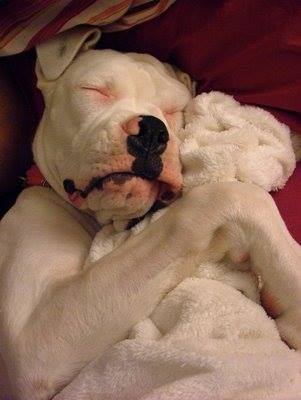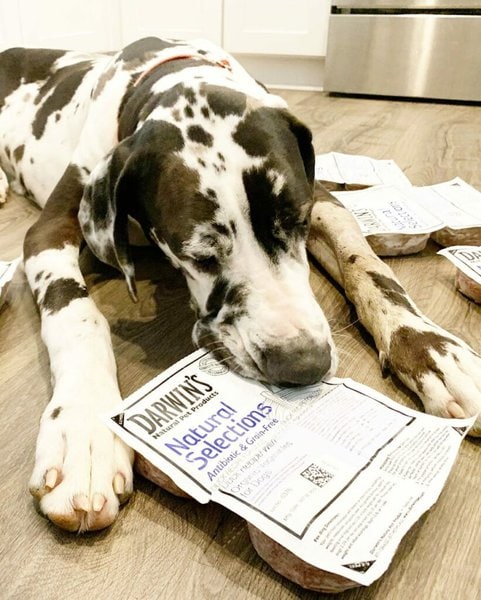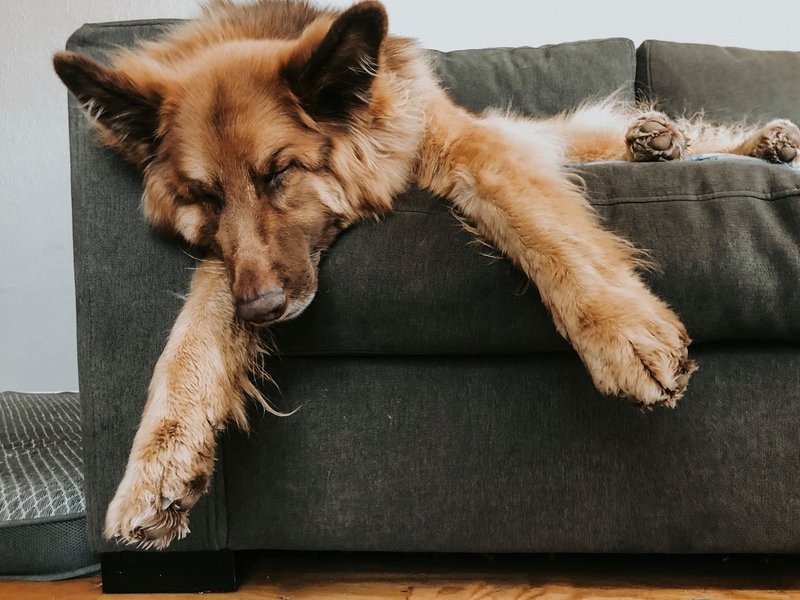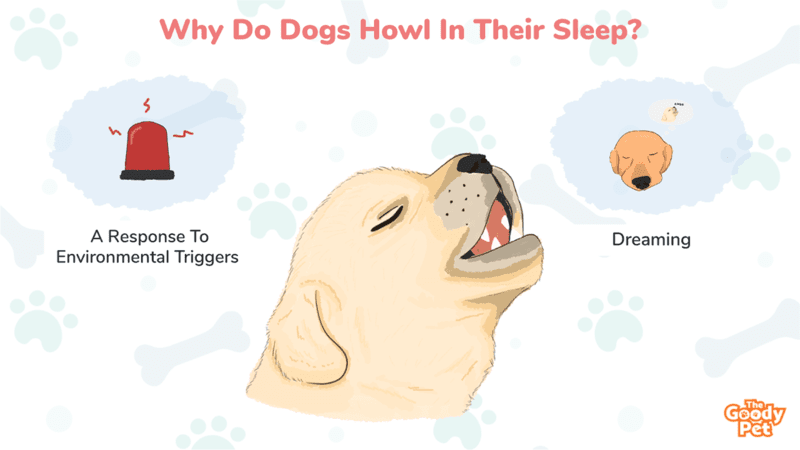If you’ve ever been awakened from your sleep by your pooch howling while asleep, you can be rest assured that you’re not the only one to experience this, and canine sleep-howling is a phenomenon that has been reported by countless dog parents. So, why do dogs howl in their sleep?
Dogs usually howl in their sleep simply because they are dreaming. Howling while asleep typically indicates that a dog has an unpleasant dream, during which barks and growls may occasionally accompany this howl.
There you have it, howling while asleep is a normal canine activity; hence there is no reason to be alarmed when your Fido suddenly starts howling. And while this behavior of howling while asleep is usually nothing to be concerned about, it may get pretty annoying and frustrating to have your sleep constantly interrupted by your dog’s howls.
Hence, this article contains practical steps to lessen the effects of your canine buddy’s night howls. However, before we go into this, let’s examine the reasons why your Fido must have been howling in its sleep.
Why Do Dogs Howl In Their Sleep?

The main reason dogs howl in their sleep is that they are dreaming. Howling while asleep can also be due to pain from an underlying medical condition, but this is very unlikely.
Howling While Asleep Usually Means The Dog Is Dreaming
It may sound unbelievable, but dogs, just like humans, typically dream while sleeping. In fact, the canine sleep cycle, as obtainable with humans, is divided into two main stages – the Slow Wave Sleep (SWS) stage and the Rapid Eye Movement (REM) stage.
The SWS stage is the first stage of sleep in dogs, and it is characterized by a reduction in brain activities, with the pooch still maintaining an active muscle tone. Consequently, dogs can easily be awakened during the SWS stage.
However, as a dog’s sleep becomes deeper, the pooch typically transitions into the REM sleep stage which is characterized by faster, irregular brain activities and rapid eye movements behind the pooch’s closed eyelids. It is during this stage of increased brain activity that dogs usually dream, thereby leading the pooch to either howl, whine or breathe rapidly.
What Do Dogs Dream About?
It is difficult to state with certainty what it is that dogs dream about due to their inability to communicate with us via human language. But several scientific theories have been put forward to explain the science behind canine dreams, and this is what we know:
- The most intense dog dreams, which typically result in howling, usually take place during the REM stage of sleep.
- The REM stage usually occurs between 15 to 20 minutes after a dog closes its eyes to sleep.
- Dog dreams are largely influenced by things that took place while the pooch was awake such as chasing a cat or retrieving a ball.
- The dog brain features a ‘pons’ that prevents them from physically acting out their dreams. The pons, however, doesn’t limit vocalization and twitching in dogs that are asleep.
- Smaller dogs tend to dream more, and as a result, they howl in their sleep more often than bigger dogs.
- Dogs that were quite active during the day sleep longer, experience a prolonged REM stage of sleep, and dream for longer periods consequently.
As A Response To Environmental Triggers
This is less common than dream-motivated howling, but dogs may also howl while asleep due to factors and ambient sounds in their environment that cause them to do so.
A dog howling while asleep, especially in the SWS stage, may be viewed as a response to another dog howling nearby, a response to car alarms, truck sirens, and even tornado warning systems.
What Should I Do When My Dog Howls In Its Sleep?

It is recommended that you avoid abruptly interrupting a dog that is howling while asleep to prevent negative reactions such as snarling and biting.
It may be alarming to hear your dog howl and trash around in its sleep, but most times, there is usually no reason to be alarmed. Dreaming is a normal, healthy canine experience, and it is important to note that dogs need uninterrupted sleep for both their physical and mental well-being and development.
Consequently, if you hear your Fido howling in its sleep, you should resist the temptation to wake such a pooch. Dogs usually can’t differentiate between friend and foe when waking from a dream, and this can result in uncharacteristic behavior such as growling, snarling, and even biting!
Make Sure The Dog Is Howling While Asleep
Howling while awake can be an indicator of various things, ranging from an attempt by the pooch to communicate to pain from an underlying health condition; Hence, to be sure that your pooch’s howling isn’t due to any of the aforementioned reasons and is, instead, motivated by the Fido’s dreams, check to ensure that the pooch is fully asleep.
When Does It Become Necessary To Wake A Dog Howling In Its Sleep?
If your dog just won’t stop howling and is keeping the entire household awake as a result, it can help gently rouse the dog. By gently rousing the pooch, you can interrupt the dog’s nightmares and help such a pooch settle into more pleasant dreams that won’t warrant howling.
Other Causes Of Howling In Dogs
If your pooch howls excessively while awake, and its howling is accompanied by other symptoms such as seizures, then it becomes necessary to see a vet. The vet will perform checks on the pooch for signs of pain and run physical tests and bloodwork to rule out possible medical conditions.
Additionally, if your dog’s howling is accompanied by symptoms such as pacing, destruction of properties, and/or depression, such a pooch is likely to suffer from separation anxiety. And, apart from spending more time with the Fido, you may need the services of a certified animal behaviorist to systematically desensitize and counter-condition the pooch.
How Can I Stop My Dog From Howling In Its Sleep?
Howling while asleep is an involuntary canine behavior that can’t be stopped. But measures can be put in place to live with this behavior of sleep-howling by dogs.
It is also important to note that howling while asleep is a completely healthy and natural behavior; Hence, you should avoid punishing your canine buddy for this behavior.
Continuously punishing your pooch for howling in its sleep will result in the pooch becoming depressed, as it will find it quite difficult to understand why it is being punished. Additionally, interrupting your pooch’s sleep to stop its howling can be quite detrimental to such a pooch’s well-being and also lead to the development of aggression in the dog.
It’s not all doom and gloom, though, and if your dog’s howls make you uncomfortable at night, there are a few measures you can put in place to cope with this canine behavior:
- If you sleep in the same room with your dog, you can try moving the dog to a different room to prevent its howling from interrupting your sleep.
- Design a den within the home that your canine buddy can feel safe sleeping in and subsequently venture into.
- Gentle rouse your dog while asleep to stop it from howling. Avoid completely and roughly waking the pooch, as this can induce an unpleasant reaction from your Fido.






